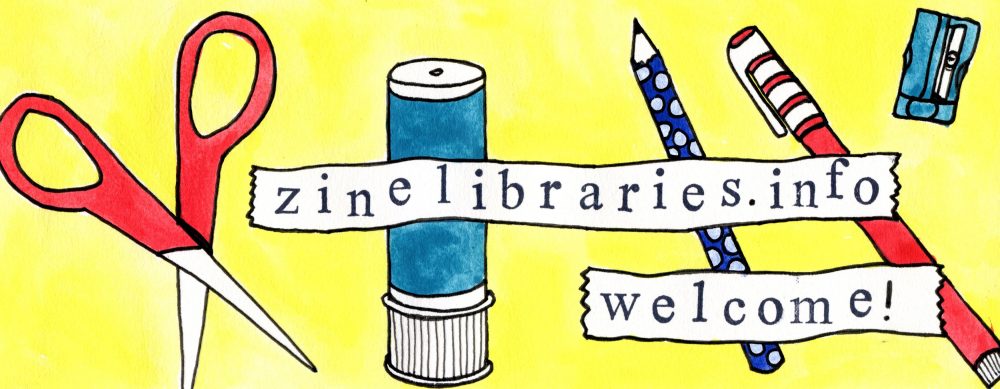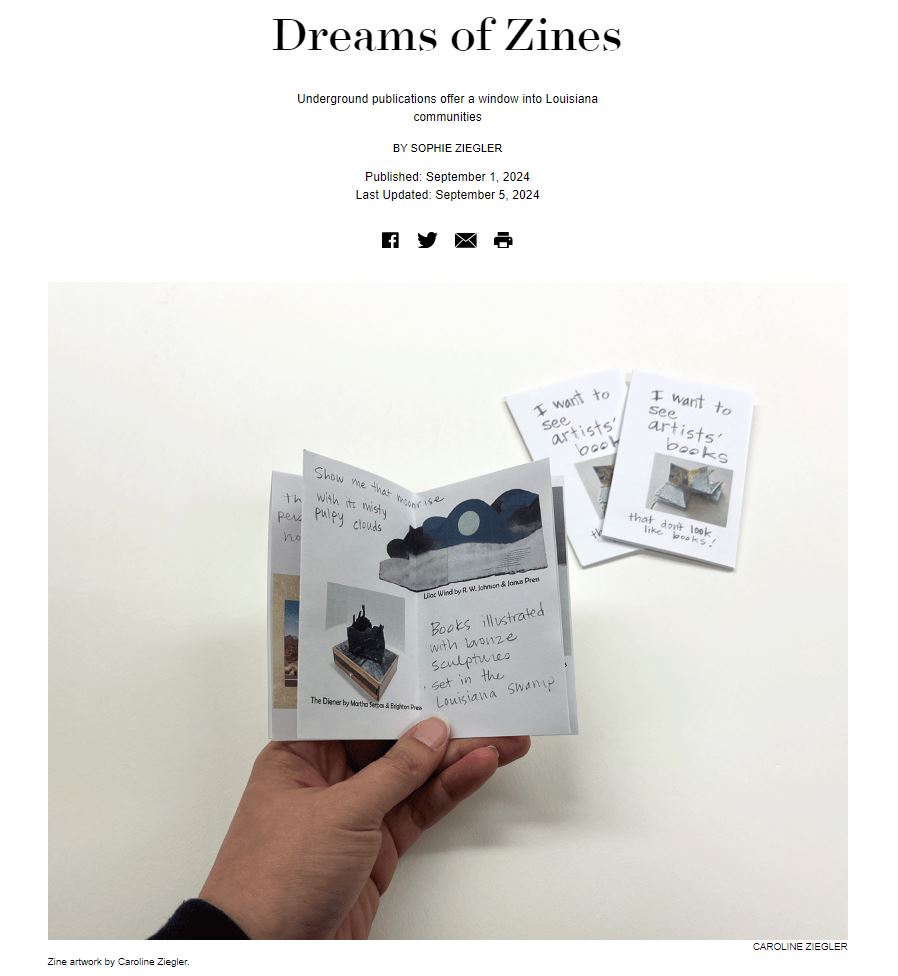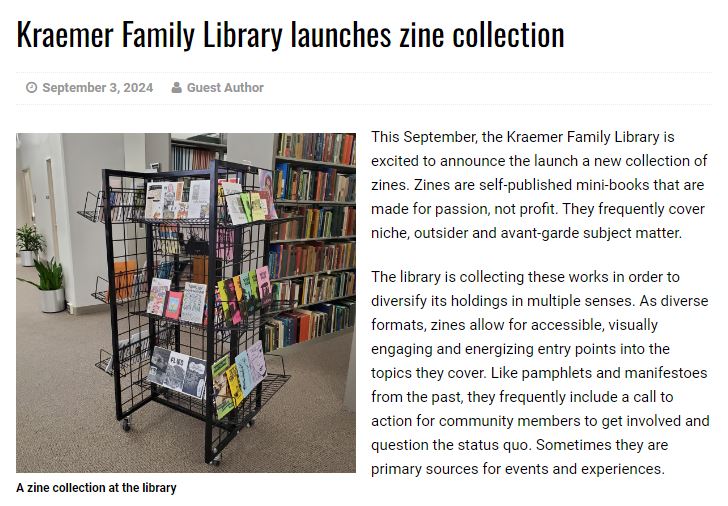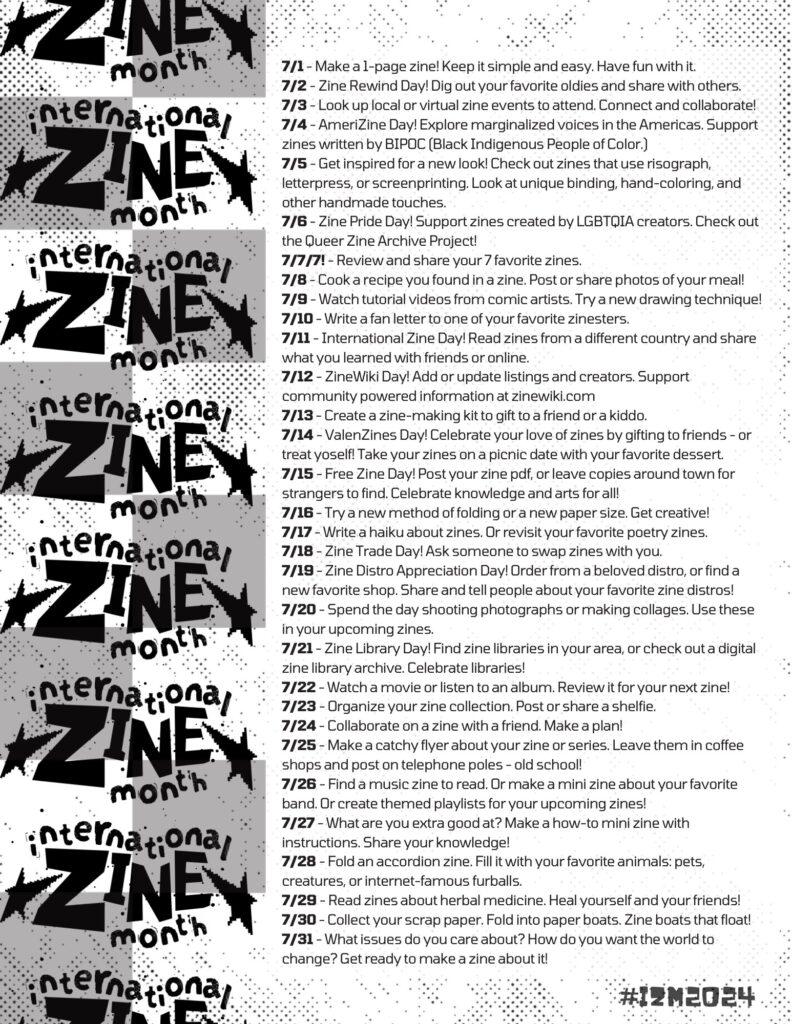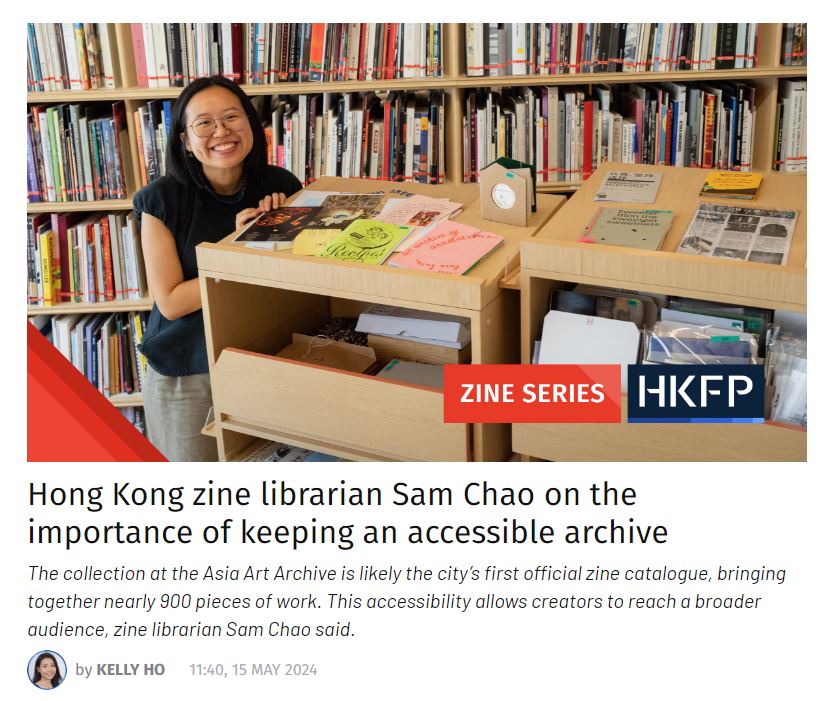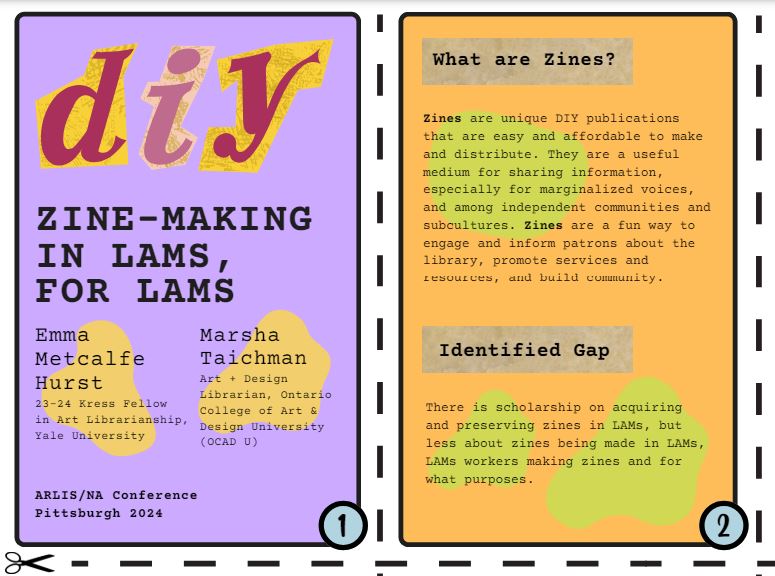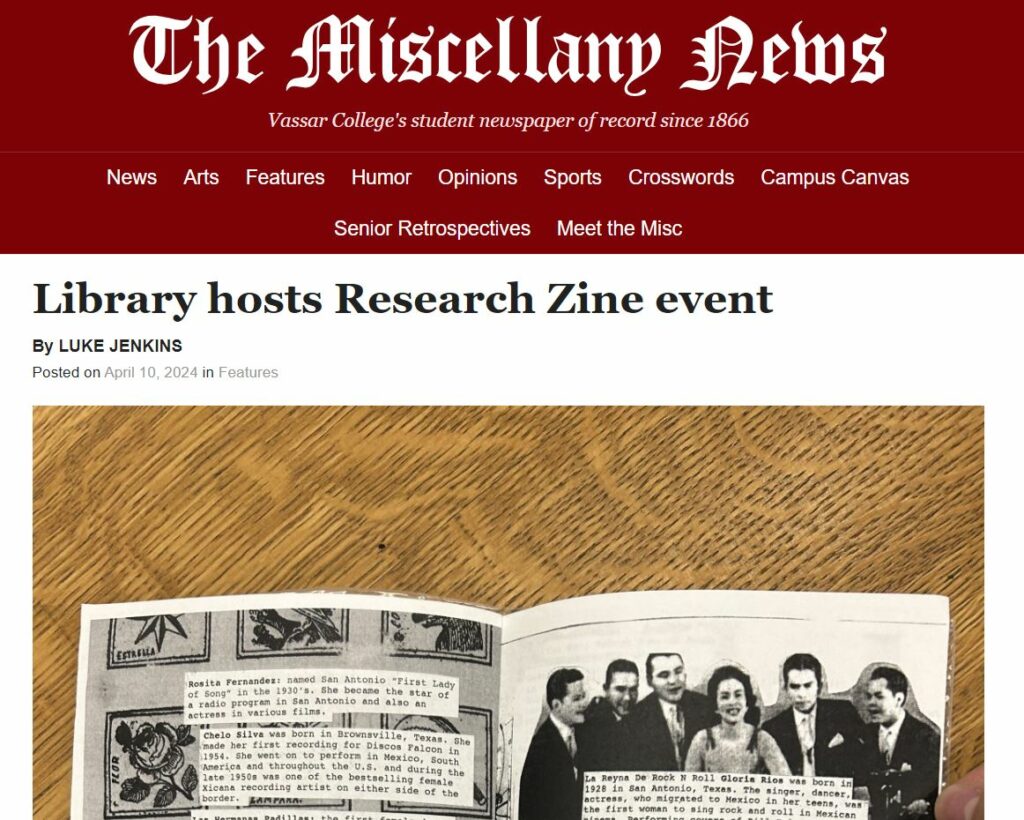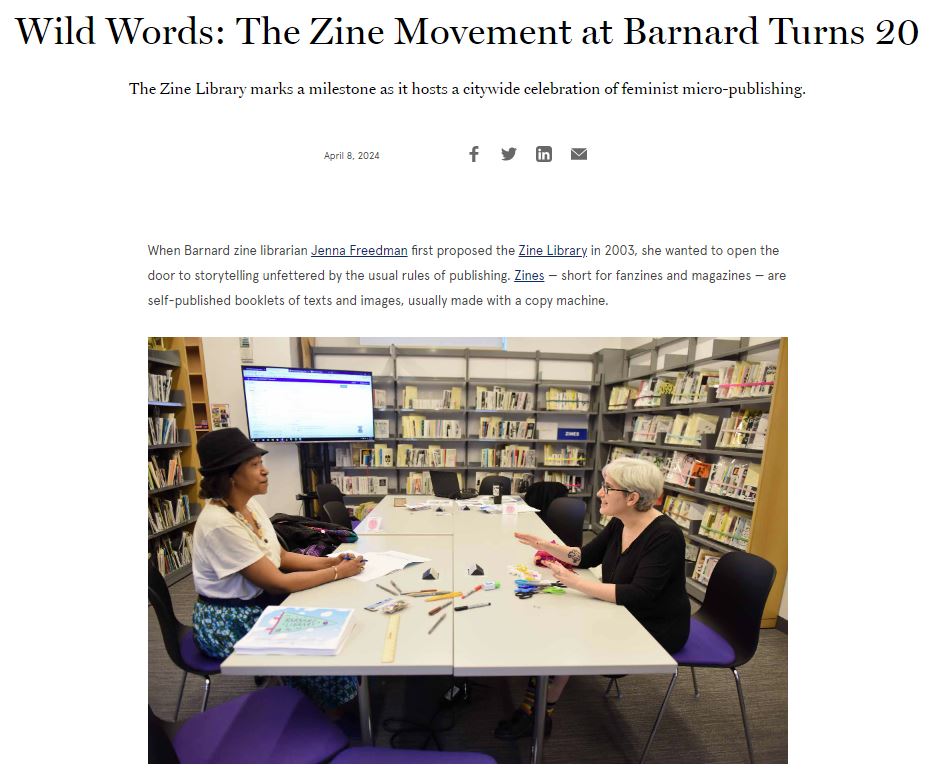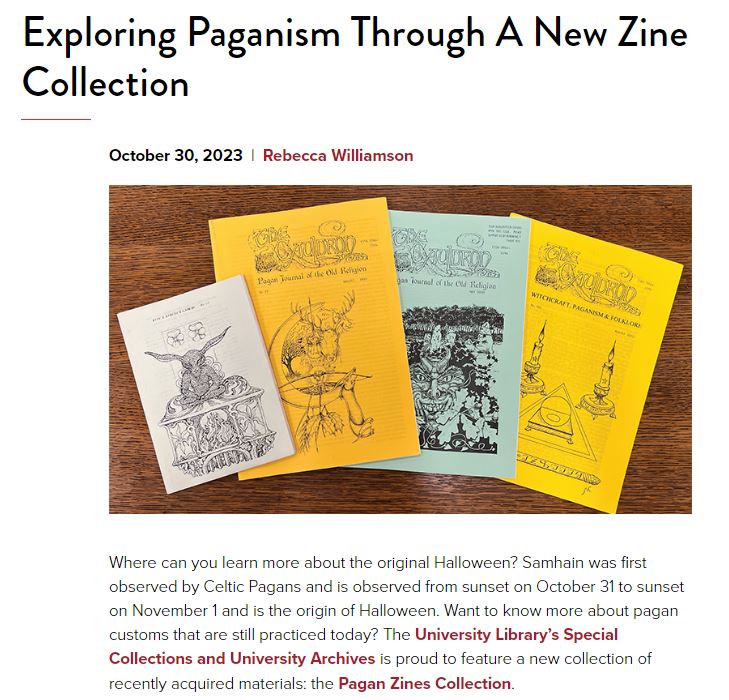If you’re a zinester or a librarian, consider taking this interesting new survey: Imagining Relationships Between Zine Creators and Zine Librarians. It’s part of a research project by Al Cassada at the University of Alabama considering the best ways for zine librarians to build relationships with zine creators. Participants from non-U.S. areas are welcome to take the survey; however, it’s only available in English. The survey takes about 15 minutes and will be open until November 1st. I’m looking forward to seeing the results!
Category Archives: zine librarians
PhD thesis on zines, health info and libraries
One of our zine librarian colleagues from England, Lilith Cooper. has shared their recently published PhD thesis titled The zINe-Between: A Creative Practice Exploration of Health, Liminality, Lived Experience and the Zines in Wellcome Collection. The abstract describes its scope:
Wellcome Collection, a museum and library in London, UK, has intentionally collected zines around health, medicine and the human condition since 2016. The outcome of a Collaborative Doctoral Award with Wellcome Collection, this creative practice thesis explores some of these 1000+ zines, alongside selected zines outside the collection, grouped around three themes: zines made in, from or about beds; zines which involve becoming disabled; and zines created during the COVID-19 pandemic. This exploration moves between physical and digital zines, feeling out both their distinct qualities and the space between them as a route into contemporary zine (re)production, cultures and communities.
This project is composed of two interwoven parts: a collection of original zines created over its duration and an accompanying critical thesis. Through a creative methodology which brings together zine making, autoethnographic and phenomenological approaches to zines, and semi-structured interviews with librarians at Wellcome, I argue that the concept of liminality offers a productive framework for examining material, cultural and political aspects of contemporary zines’ content, production and communities of practice. In turn, the thesis contributes to a reconceptualisation of liminality, beyond the carefully managed processes of transition described in ethnographic accounts, as ongoing, affective, embodied, messy, and non-linear.
Both drawing on and extending interdisciplinary theories of liminality, the thesis focuses on zines made from and about spaces (sickbeds), experiences (becoming disabled) and times (the COVID-19 pandemic) that are in-between, transitional, or transformative. Whilst narrative approaches and approaches that prioritise the usefulness of lived experience to medicine, research or policy often treat liminality as a period of chaos, nonsense or absence, these zines made of and from the in-between offer insight into these periods of liminality in experiences of health, illness and disability. They hold space for the episodic, fragmented and non-linear, engage in affective sense-making, (re)produce third-space knowledges and prioritise the uses of lived experience for peers.
Within the original set of zines created alongside this thesis are zines which directly addresses the concerns of chapters, zines which involve and document wider practices of reproduction, distribution, and collection, as well as those which challenge or disrupt conventions of academic research. Zine making, as a practice-based research method, offers a generative approach to both an archival collection which is proximal, intimate, living, and liminal, and to archival objects which are visual-material-textual, records of practices and processes, and traces of communities of practice as much as products. Produced from the liminal positionality of doctoral research, these zines echo the ways that the zines in Wellcome Collection document and inhabit liminal experiences, spaces and times.
Dreams of Zines: zine libraries in Louisiana
I loved the article “Dreams of Zines” by librarian/archivist Sophie Ziegler in the Louisiana-focused magazine 64 Parishes. They quote Louisiana State University student Adrienne Lewis: “When I visit a new place, I always try to find where the zines are. Every time I find zines, I find my people.”
The second half of the article discusses zine collections in archives and special collections around Louisiana and highlights library outreach efforts oriented around zines. Well worth a read!
New zine collection in Colorado Springs
The University of Colorado at Colorado Springs has a new zine collection, as announced in the article Kraemer Family Library Launches Zine Collection. The collection resulted from a project by UCCS librarian Liz Brown through the Radical Librarian Institute, organized by the California Rare Book School. The Radical Librarian Institute also funded $250 grants to student zinesters from diverse backgrounds (read about that in the announcement The Kraemer Family Library is Building a Zine Collection and We Want You!). The UCCS student newspaper also wrote about the new zine collection in the article “Library Zine Collection Brings UCCS Student’s Passions and Creativity to the Forefront” by Livi Davis.
The UCCS student newspaper also wrote about the new zine collection in the article “Library Zine Collection Brings UCCS Student’s Passions and Creativity to the Forefront” by Livi Davis.
Zine course at the Braille Institute
A seven-week zine-making course was recently offered at the Braille Institute in Los Angeles as part of the programming of their library. A Radical Librarianship Institute project designed the course for blind adult and youth students. Read all about it in the Summer 2024 issue of Scene, newsletter of the Braille Institute.
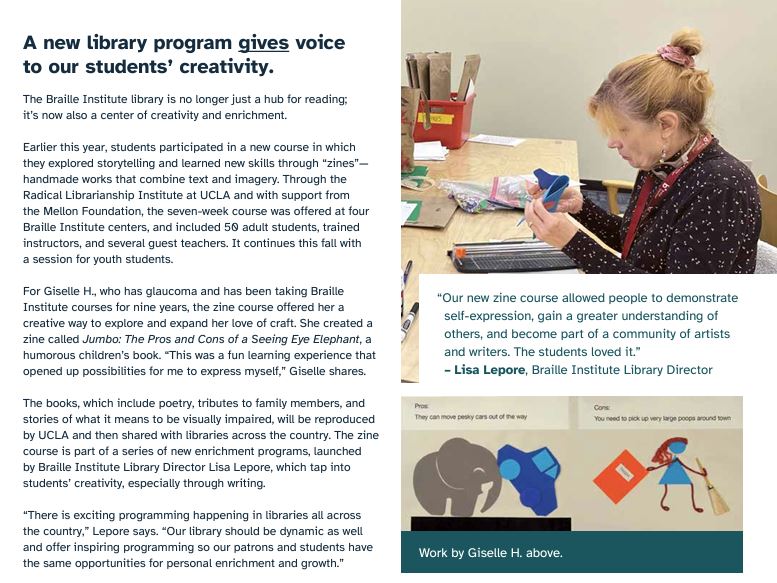
Presentation on the locality of zine culture
Our friend and zine scholar Kiyoshi Murakami recently gave a presentation on how important the local aspect of zine culture can be. You can see his presentation notes online: Zine Culture and Locality/Regionality: The Significance of Practices Derived from That Relationship (consider using DeepL for a more accurate translation). Murakami describes the significance of small local publishers to cultural formation in local communities. He also talks about the usefulness of zine events like workshops or zine fests, and recommends zine archiving as a valuable practice, suggesting that zine libraries might best be created in partnership with public libraries, public museums, and community centers.
Chicago’s Read/Write Library pops up
The Read/Write Library in Chicago has a pop-up exhibit happening now through July 21st at the Jane Addams Hull-House Museum. After being closed for three years, it’s great to see the library back in action! The Read/Write Library collects books, comics, journals, newspapers, and zines published by those in the Chicago area.
The pop-up also included an abridged history of the library written by founder and executive director Nell Taylor.
- February 2006: In the middle of a blizzard, forty strangers gather at the now-defunct Mercury Cafe in West Town to discuss the project. People bring materials to donate, and more keep coming after. Volunteer librarians and archivists convene weekly in my Humboldt Park apartment to devise new approaches to cataloging and presenting collections that prioritize representation and self-determination. At first, we would call it Chicago Underground Library, using media to connect the dots between different creative communities—ones that might exist for only brief moments in apartment galleries, basement DIY venues, or purely as ephemera. Very quickly, we expanded beyond creative material to draw connections between neighborhoods, cultural and political movements, and everyday residents of the city.
- Fall 2006: We move the growing collection into a filing cabinet in the basement of MoJoe’s Hot House, a coffee shop in Avondale. Anyone interested could learn how to catalog the library material through our Cataloging Socials.
- Fall 2007: MoJoe’s is sold. The collection finds a new home at Butchershop, a gallery and studios for artists and musicians on Lake Street. Still humble in size, the growing library now occupies two filing cabinets.
- Winter 2008: The arts and activism-focused publication AREA Chicago and the artist residency inCUBATE form the Orientation Center in a storefront at the Congress Theater in Logan Square, and invite the Underground Library to be a partner in the space.
- Winter 2010: Center closes. We move the collection into the lobby of Red Tape Theater, in the parish house of St. Peter’s Episcopal Church in East Lakeview.
- January 2011: Another Chicago blizzard blows open the windows of the parish house and buries half the collection in snow. Thanks to quick work by conservation volunteers, most of the materials are salvaged (you may notice some crinkly zines here). The library leaves St. Peters; we begin programming Pop Up Libraries in Uptown, Logan Square, and elsewhere throughout the city to keep the collection public as we look for a new home.
- Fall 2011: The library returns to Humboldt Park in a new and permanent location, and we change its name to Read/Write Library in recognition of its unique, participatory, and community-driven nature. Pop Up Libraries continue as a regular part of the programming, tailored to the locations and audiences of our partner schools, arts and community centers, and others across the city—even in other cities and states.
- Winter 2017: After years of developing our programs, we triple the size of our Humboldt Park space, making room for expanded activities and collection access. As the collection reaches new audiences, it continues to grow, filling out the larger space.
- Winter 2021: The gentrification of Humboldt Park catches up with us. Rising rental costs force Read/Write Library to leave after a decade in the neighborhood, fifteen years after we first convened there. The collection goes dark, placed in storage.
- Spring 2024: Read/Write Library returns! With the summer Pop Up Library at the Jane Addams Hull-House Museum, one of Chicago’s historic centers of community-driven cultural production, we are excited to reopen the library to readers and contributors.

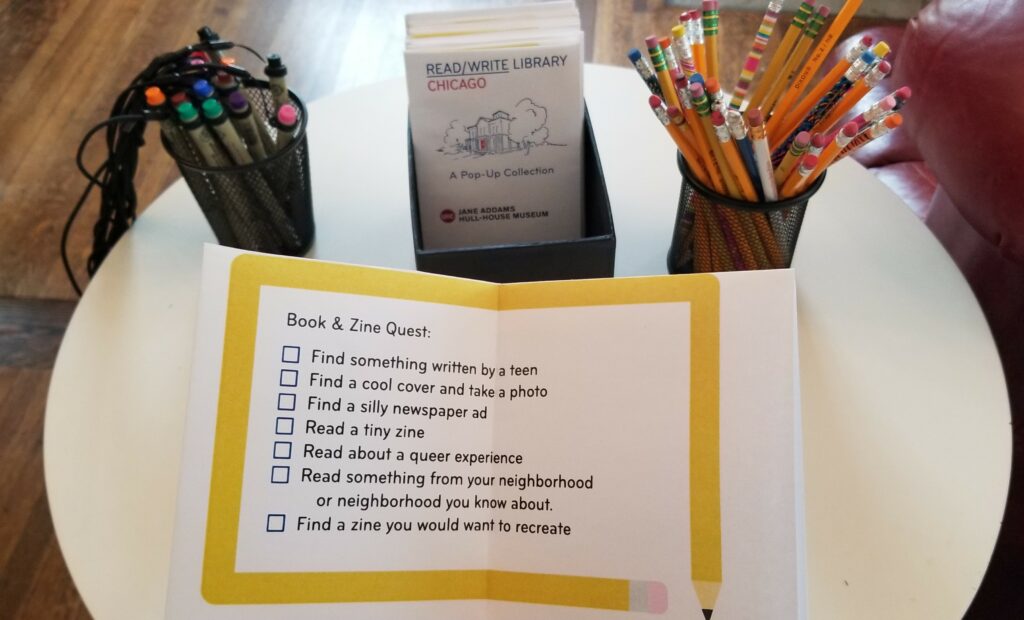
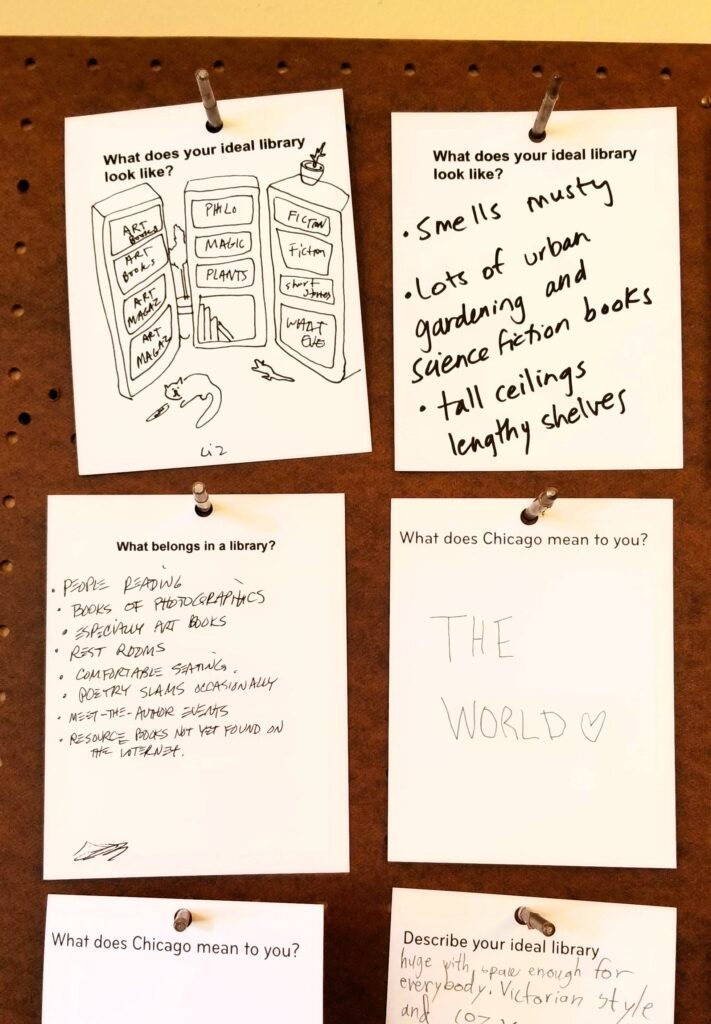
International Zine Month 2024
July is International Zine Month!! IZM was created in 2009 by Alex Wrekk (Stolen Sharpie Revolution, Brainscan, etc.) to celebrate zines and zinesters. There’s a list of suggested activities at Alex’s website, Stolen Sharpie Revolution. Use hashtag #IZM2024 to share what you’re doing. Make a special note of Sunday July 21st, which is Zine Library Day! The traditional way to recognize Zine Library Day is by visiting a zine library and bringing them a tasty snack. Consider planning an event in your library!
The 2024 International Zine Month flyer was created by Alex Wrekk.
Love this image! It was created by Nina Zina of Echo Zines, a feminist zine distro.
Launch of the South Side Zine Library in Chicago
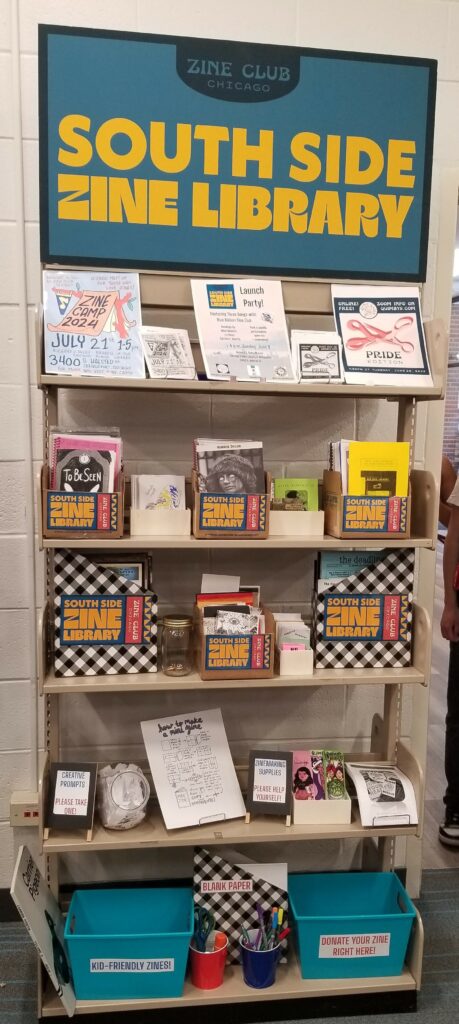
June 9th marked the launch of the South Side Zine Library, located within the Richard J Daley Branch of the Chicago Public Library (3400 S Halsted St in Bridgeport). The new library is a partnership between Chicago Public Library, Quimby’s Bookstore, Zine Club Chicago. Founded by Cynthia Hanifin, the library got an excellent kickoff with readings, zine making, and a punk a capella performance.
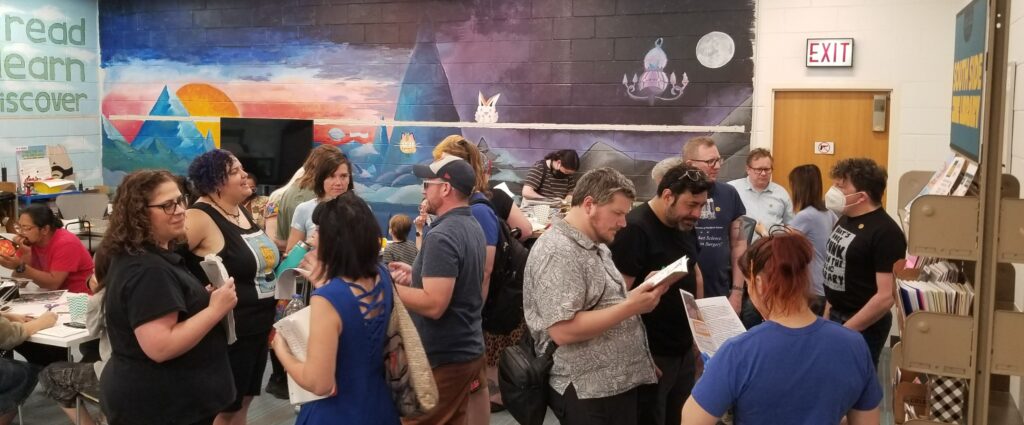
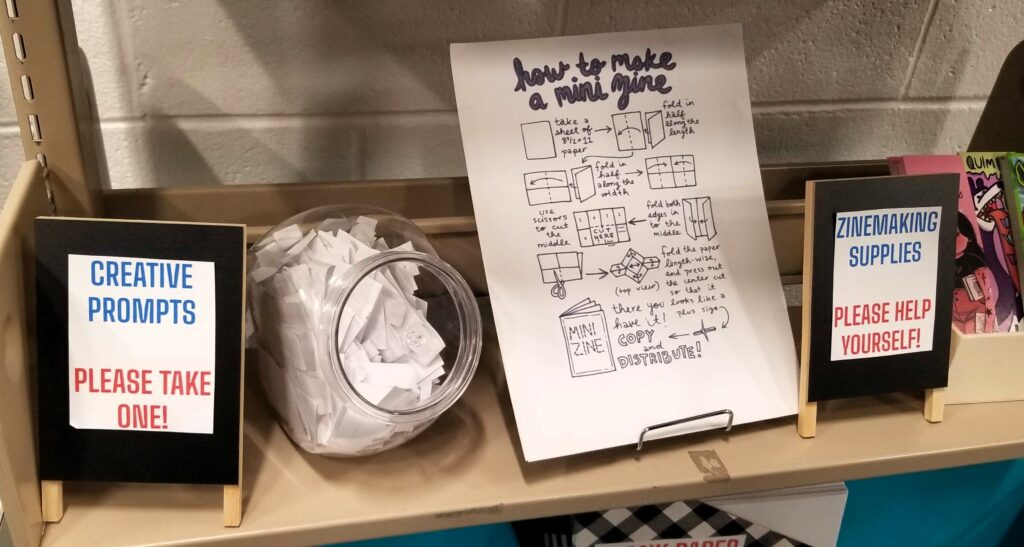
Interview with the Asia Art Archive zine librarian
Really enjoyed this insight into the zine collection at the Asia Art Archive (AAA) in Hong Kong. In the article “Hong Kong zine librarian Sam Chao on the importance of keeping an accessible archive,” Kelly Ho of the Hong Kong Free Press describes the collection, of which 70% is created by artists based in Hong Kong. The collection includes what is likely the city’s first official zine catalogue. The Zine Librarians Code of Ethics also gets a shoutout.
Be sure to check out all four parts of the Hong Kong Free Press series on Hong Kong’s zine scene.
Poster on Zine-Making in Libraries, Archives, and Museums
A poster created by Emma Metcalfe Hurst and Marsha Taichman describing “DIY: Zine-Making in LAMS, for LAMS” was presented at the ARLIS/NA 52nd Annual Conference (Art Libraries Society of North America) in April. The poster, shaped like a minizine (!!), describes benefits and challenges of zine-making in libraries, archives, and museums. It also links to a survey on zine-making in LAMS that’s open until May 28th, which has an option for respondents to share digital copies of their zines to help LIS workers get inspired to make their own zines. Please take the survey and share with colleagues to help with that research!
Zine research event at Vassar
An article in Vassar College’s student newspaper by Luke Jenkins, “Library hosts Research Zine event,” highlights the library’s zine collection. Their recent “Zines For Research” event helps students see the potential for using zines in research projects and theses. Always great to see a Cats Hate Cops mention!!
Celebrating 20 years of the Barnard Zine Library
Lovely to see a big celebration of twenty years of the zine collection at Barnard College! The article “Wild Words: The Zine Movement at Barnard Turns 20” has info about the idea behind the Barnard Zine Library and the Barnard Zine Collective, both started by zine librarian Jenna Freedman.
New zine fest organized by Reed College librarians
The first Reed Zine Fest, to be held March 30, 2024, was organized by Reed College (Portland, Oregon) librarians Ann Matsushima Chiu and Chlöe Van Stralendorff. An article in the Reed College magazine, Risograph Dreams by Megan Burbank, highlights their work coordinating the fest and offering other tools like a risograph machine and zine-making kits. If you’re in the Portland, Oregon area, go check out the new zine fest to support their work! 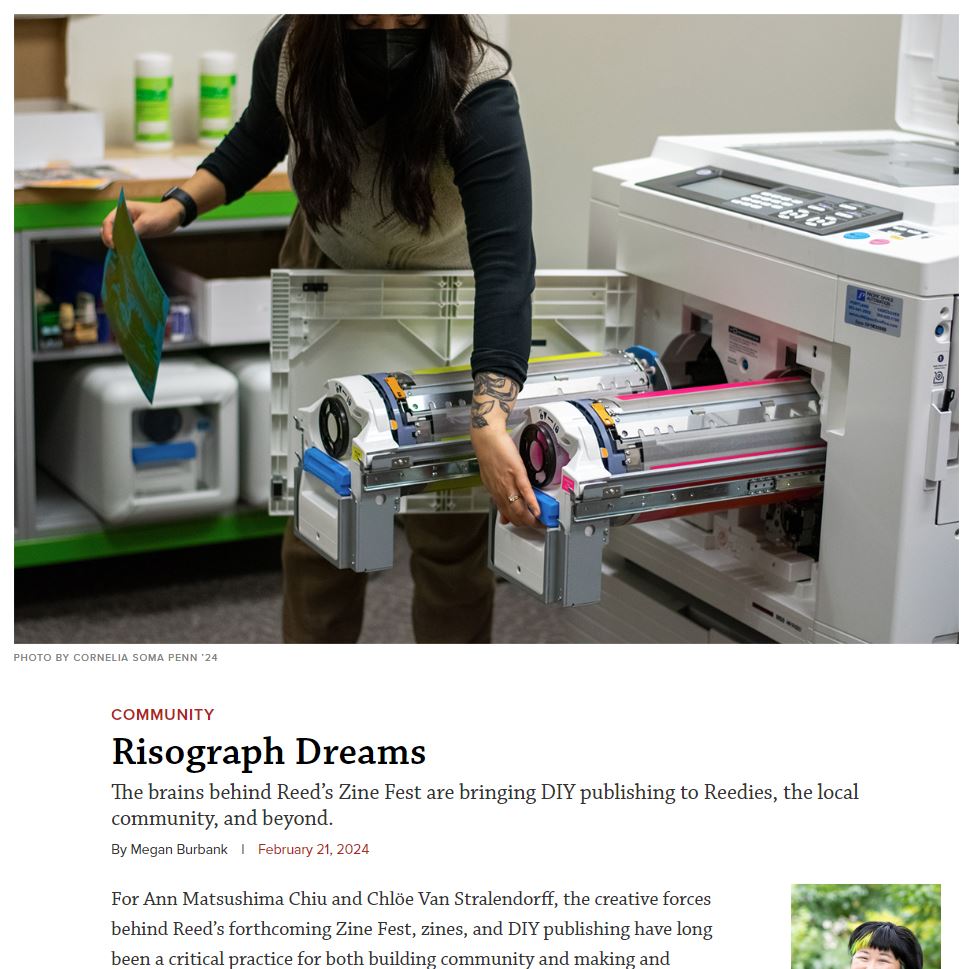
New pagan zine collection at San Diego State
Here’s a new collection that I’d missed when it was first announced in October: the new Pagan Zines Collection at San Diego State University. The blog post Exploring Paganism Through A New Zine Collection by Rebecca Williamson describes the collection:
The Pagan Zines also augment SDSU’s larger collection of materials regarding spirituality and religion. This new collection consists of periodicals and books published primarily in the United Kingdom and Europe during the 1980s and 1990s. It represents a wide range of strands within the pagan movement, including Wicca, Druidry, Asatru, Heathenism, Slavic Native Faith, Finnic Native Faith, and similar movements. Topics include cultural history, archaeology, anthropology, folklore, and current events.
